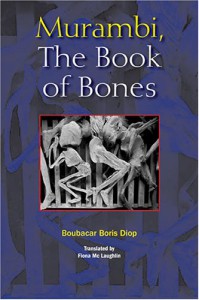20252
Followers
28
Following
Judy Croome: Author on the Prowl
Judy Croome lives, writes and reads in Johannesburg, South Africa. A novelist & poet, Judy loves cats, exploring the meaning of life, chocolate, rainy days and cats (who already appear to have discovered the meaning of life.) Visit Judy on www.judycroome.com or join her on Twitter @judy_croome
 This is a multi-voiced novel about the violent 1994 Rwandan genocide and gives a good cross-section of all the players involved in this horrific event.
This is a multi-voiced novel about the violent 1994 Rwandan genocide and gives a good cross-section of all the players involved in this horrific event.The language is stilted and quaint, possibly because this is an English translation.
There are some interesting and complex characters: the rebel Tutsi, Jessica Kamanzi, is a wonderful character who symbolizes the strength and hope that lies in Africa's people. Cornelius Uvimana was another thought-provoking character; his development from a rather brash and arrogant Rwandan exile returning home four years after the genocide, to a mature journalist driven by the revelation of his family secrets to become a “chronicler [who] could at least learn … to call a monster by its name”[Kindle Location 1739] was perhaps the most poignant.
The narrative does flounder in a soul-deep pain and self-hate, which, at times, is bitterly projected onto a prejudiced stereotyping of the whites in Africa:
“Take the example of the Afrikaaners in South Africa. They were real foreigners, those ones, and they turned out to be infinitely more cruel to the blacks of that country than anywhere else."' Cornelius says [Kindle Location 718].
“Infinitely more cruel?” Really? What genocide did the Afrikaaners in South Africa commit? Yes, there was the abuse of human rights with the implementation of Apartheid laws in 1948. Yes, there have been recent massacres in South Africa.
But, whether we talk of the Sharpeville Massacre (1960; 69 killed;180 injured; white on black violence) or the Church Street bombings (1983; 19 killed; 217 wounded; black on white violence), there should be some rational historical perspective maintained, even if the narrative is fictitious.
The only 20th century genocide that occurred on South African soil was of the Afrikaaner prisoners who lost their lives in the concentration camps of the British High Command during the second Boer war of 1899-1902 (26 000 dead.)
Even that’s nowhere near the sheer atrocity of the Rwandan genocide. Just think of the statistics of the Rwandan genocide: 90 days to brutally murder 800 000 fellow countrymen using only machetes and guns; that’s an average of 9 000 people A DAY. Even Hitler wasn’t that efficient.
By choosing to scapegoat the white Afrikaaner, and the French, and even the Americans (who are found wanting because of their interest in the 1994 World Cup over the Rwandan genocide), the narrative struggles with the personal responsibility of the Rwandan people as free and conscious individuals rather than as an oppressed race. As Jessica said to Cornelius, “To kill almost a million people in three months took a lot of people. There were tens or hundreds of thousands of killers.” [Kindle Location 839]
Without overtly stating it, the narrative implies that each of these killers can’t be held responsible for their actions, because they have always been victims: “Now, his return from exile could no longer have the same meaning. From now on, the only story he had to tell was his own. The story of his family. He had suddenly discovered that he had become the perfect Rwandan: both guilty and a victim” [Cornelius Uvimana, Kindle Location 832 ]
This subtle thread, this perhaps unconscious desire, to abdicate the Rwandan peoples’ responsibility for the genocide tends to diminish the story’s power: "I know the damage that foreigners did to us, four years ago and well before.” [Siméon Habineza, Kindle Location 1644]
Ultimately, this book is so weighed down by the sheer immensity of the horror of the Rwandan-on-Rwandan genocide that it doesn’t offer any new insights into how a nation (or a race) can transcend the cult of victimhood that is so debilitating to individual and national progress.
Although MURAMBI makes a valiant attempt to explore and find the impartial “why” behind the genocide, it does not escape the easy convenience of laying the blame for the 1994 Rwandan descent into hell on Africa’s recent colonial history.
With this caveat in mind, this is still a book worth reading, if only to remind ourselves that the nature of evil is such that no one is immune from it. “Evil is within each one of us,” says Cornelius’ uncle [Kindle Location 1574]. He is right: rich or poor, educated or illiterate, black or white, African or foreign, the capacity for evil slithers through our souls, waiting for the opportunity to burst free from the chains of civilisation. What then is our responsibility in making sure that the capacity for these terrible genocides is expunged from the human DNA?
MURAMBI, THE BOOK OF BONES is a chronicle that tells us that human nature still has a long way to go before we reach our highest potential for good.
(Note: Statistics quoted sourced from Wikipedia)


